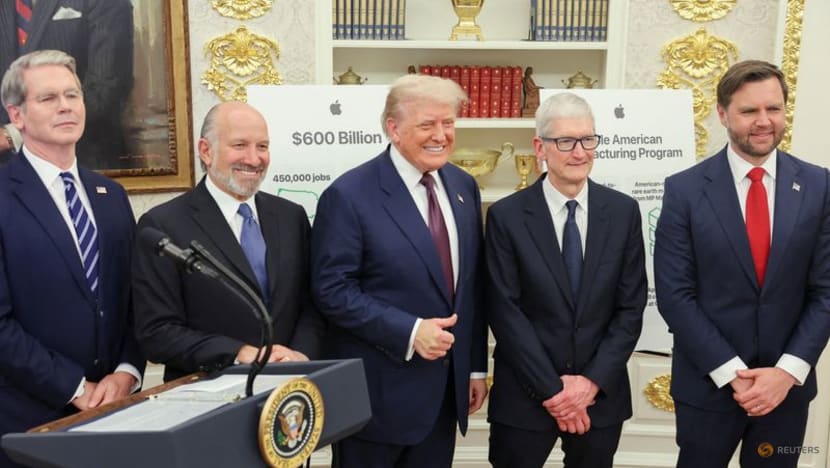Commentary: Tariffs on tech sector mark a twist in America’s trade war
The biggest losers of Donald Trump’s semiconductor tariffs will be smaller companies that lack the ability to obtain an exemption, says Antonio Fatas of INSEAD, Singapore.

US President Donald Trump, US Treasury Secretary Scott Bessent, Commerce Secretary Howard Lutnick, Apple CEO Tim Cook and US Vice President JD Vance stand during the presentation of Apple's announcement of a US$100 billion investment in US manufacturing, in the Oval Office at the White House, Aug 6, 2025. (Photo: Reuters/Jonathan Ernst)

This audio is generated by an AI tool.
SINGAPORE: US President Donald Trump has threatened tariffs of up to 100 per cent on US imports of semiconductors. In another unprecedented move, Nvidia and AMD are now required to give the US government 15 per cent of their revenues from chip sales to China.
These two decisions target the high-tech sector, which is crucial for the US economy but also central to many countries due to its impact on growth and its role in complex supply chains. Where do we go from here?
Let's take a step back and acknowledge that no tariff decision is final under the current administration. Starting with initial tariffs on Canada, Mexico and China, followed by the shock of Liberation Day, a pause and a slow succession of bilateral trade deals, we find ourselves with the most complex tariff structure the US has had in decades. There are not only different rates by country or goods, but also a growing list of exemptions for individual companies.
To make matters worse, some of these tariffs can easily change based on the seemingly volatile will of the US president. The recent increase in tariffs on Brazilian and Indian imports, explicitly motivated by political reasons, is an example of what could happen to other countries in the future.
In this context, US tariffs on the high-tech sector should be taken with a grain of salt. As of today, they are merely announcements that have yet to be fully implemented.
Additionally, exemptions have already been announced for companies that produce in the US or “plan to do so”. Following a meeting between Apple CEO Tim Cook and President Trump, Apple was granted an exemption from the tariff on imported semiconductors.
Other companies in Asia, such as TSMC in Taiwan and Samsung in South Korea, believe that they should be exempted as well because of their presence or commitments in the US. Given recent history, it would not be surprising if Trump requested additional efforts or commitments from some of these companies in exchange for exemption from these tariffs.
ECONOMIC CONSEQUENCES
Regardless of the uncertainty, some companies and countries will soon face large tariffs on semiconductors, and some US companies will face taxes on their exports. What will be the economic consequences of these decisions?
For the US, these tariffs will likely put its companies at a disadvantage. Any US company that needs to import semiconductors for domestic manufacturing will now see its costs increase relative to competitors abroad. Although the Trump administration ignores this effect, it is a textbook consequence of such tariffs: They reduce a country's competitiveness and hurt domestic companies.
US consumers will likely face higher prices due to the increased production costs, a phenomenon already evident in US price trends. Consumer prices rose by 2.7 per cent year-on-year in July.
Will these tariffs result in increased production in the US?
While they clearly create an incentive for foreign companies to move production to the US, it is unlikely to provide many benefits in practice. The infrastructure, skills and investments required to manufacture semiconductors in the US are unlikely to materialise in the short term.
It is also possible that, even with such high tariffs, companies will not find it profitable to move their production to the US. They may simply abandon the US market, leaving it to companies that have secured tariff exemptions.
This demonstrates how tariffs benefit some companies or sectors at the expense of others, which might ultimately hurt economic competition. We should not be surprised by intensified lobbying efforts. Apple, for instance, pledged to invest US$100 billion in domestic manufacturing, in line with the Trump Administration’s America First agenda.
WORLD REMAINS HOSTAGE TO US TARIFF WAR
However, companies that have secured exemptions may still incur higher costs from dealing with the volatile requests from the US administration. These costs will also translate into higher prices for consumers.
The biggest losers will be smaller companies that lack the ability to obtain an exemption. Chipmakers from the Philippines are a good example. Semiconductors account for over 70 per cent of the country’s exports, so it’s no surprise that Manila has stepped up its efforts to obtain an exemption similar to that granted to Apple.
The world economy remains hostage to an unresolved tariff war started by the US. A cycle of tariffs, pauses, deals and exemptions will make global trade costlier and more unpredictable. Winners and losers will be decided less by market forces than by political favour, as CEOs and world leaders dance to the rhythm of Trump’s negotiating game.
In the meantime, both the US economy and the wider world bear the cost of a trade policy defined more by impulse than by strategy.
Antonio Fatas is Professor of Economics at INSEAD, Singapore.

















